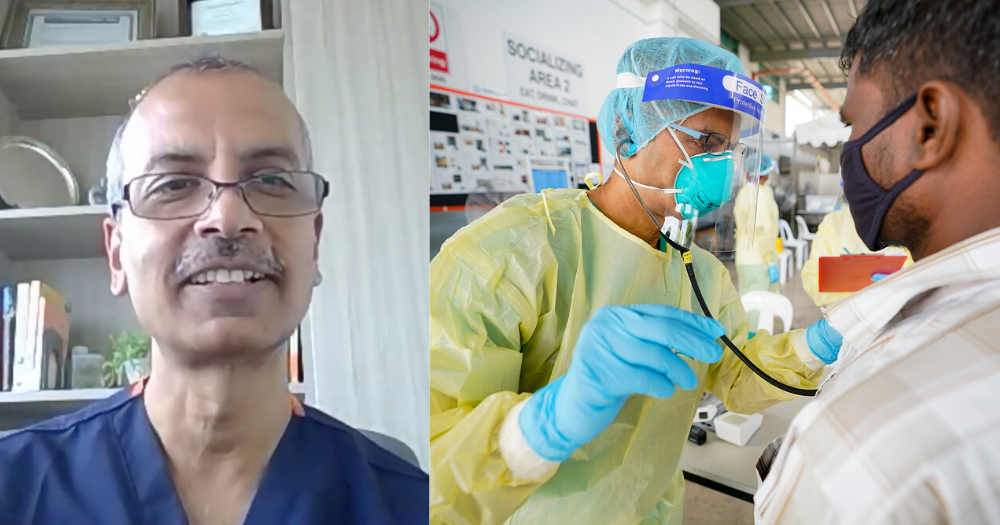In recent weeks, Singapore’s Covid-19 outbreak has been concentrated primarily amongst one particular group of people: low-wage migrant workers living in dormitories.
Per the Ministry of Health (MOH)'s Apr. 30 situation report, 13,842 out of 16,169 — or 85.6 per cent — of Singapore’s Covid-19 infections are Work Permit holders living in dormitories.
To address the serious situation in the dormitories, many healthcare workers have given their time and energy to provide on-the-ground support to those living there.
And Assoc. Prof Zubair Amin is one of around 800 medical staff from the National University Health System (NUHS) who volunteered to be deployed in Singapore’s dormitories to provide on-site medical support.
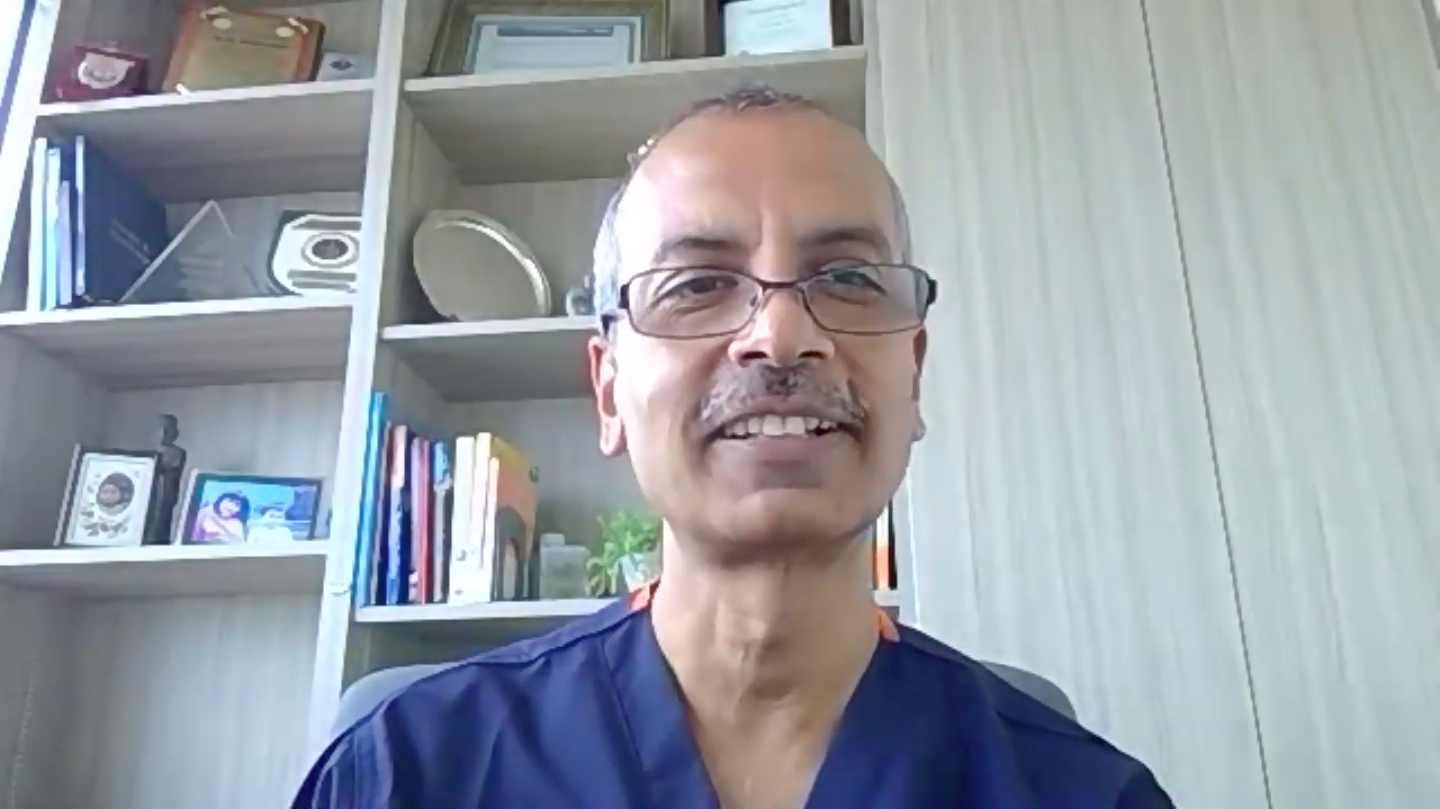 Screenshot via video call interview
Screenshot via video call interview
Scale of the dormitories was "mind-boggling"
Zubair, who heads the Department of Neonatology at National University Hospital, and also teaches paediatrics at the NUS medicine school, has been volunteering at the dormitories' medical posts for seven hours each day over the past three weekends so far, from 8am to 3pm.
He has mostly been at Sungei Tengah Lodge, Singapore's largest purpose-built dormitory that has a capacity of 25,000 workers, but also spent some time at Tuas View Dormitory.
Sungei Tengah Lodge also happens to be one of the first few dormitories gazetted as an isolation area by MOH, and as of Apr. 30, had 930 Covid-19 cases linked to the cluster there — making it the second-largest cluster of confirmed cases here after S11 Dormitory in Punggol.
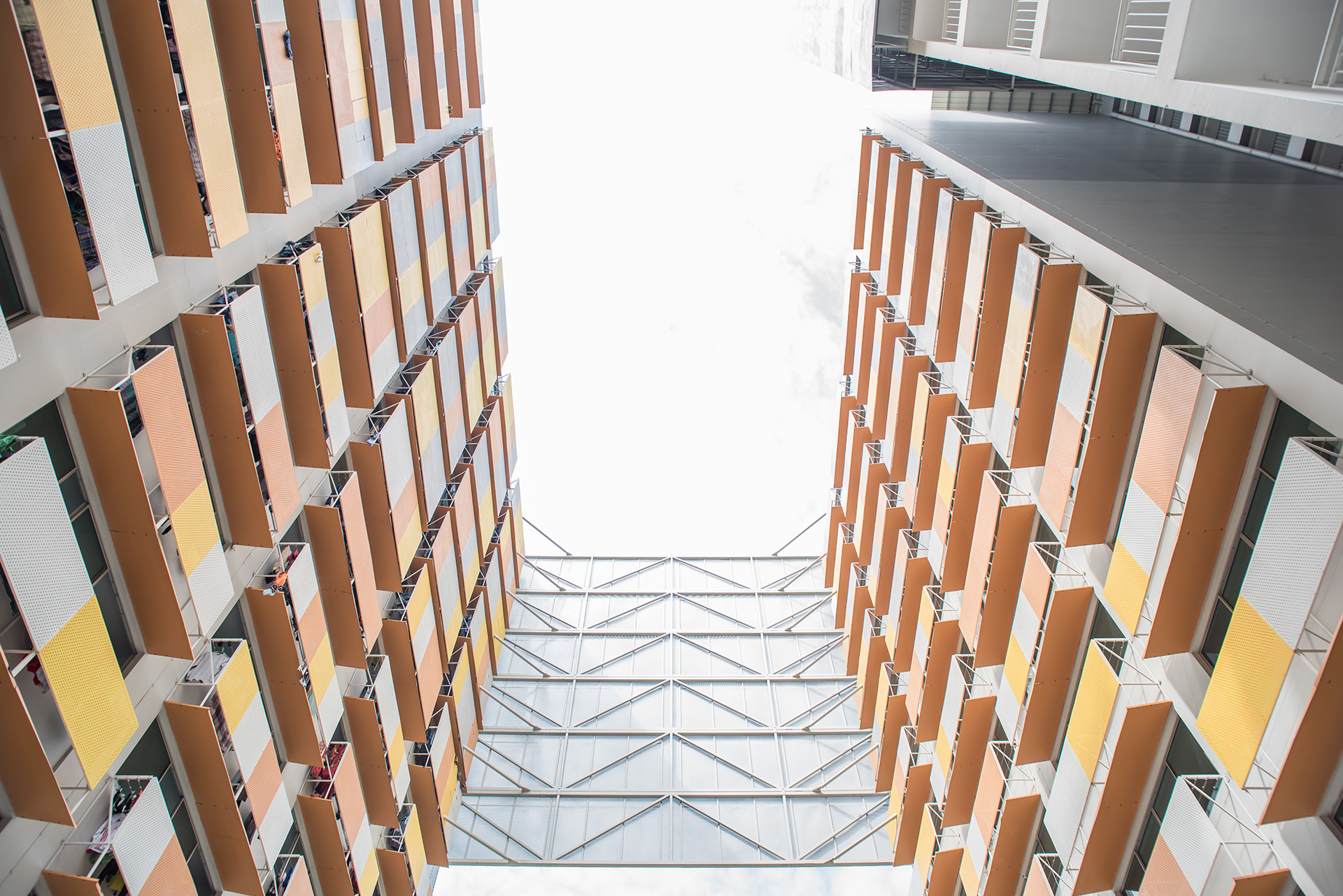 Photo via Sungei Tengah Lodge website.
Photo via Sungei Tengah Lodge website.
And the sheer scale of the situation on the ground certainly did not escape Zubair's notice when he arrived there for duty on his first weekend shift:
"So when we reach there, this whole setup and the lack of familiarity and the enormity of this whole thing that I'm in looking at — you know, these big clusters and their 25,000 dorm residents, and many, many of them are actually patients — I mean, this scale was mind-boggling.
Mind-boggling. And it took me a while to overcome that apprehension, the fear."
Seeing up to 150 patients every day
At the dormitory, Zubair joins a team at the medical post, which is staffed by doctors, nurses, paramedics, pharmacists, and other operations personnel.
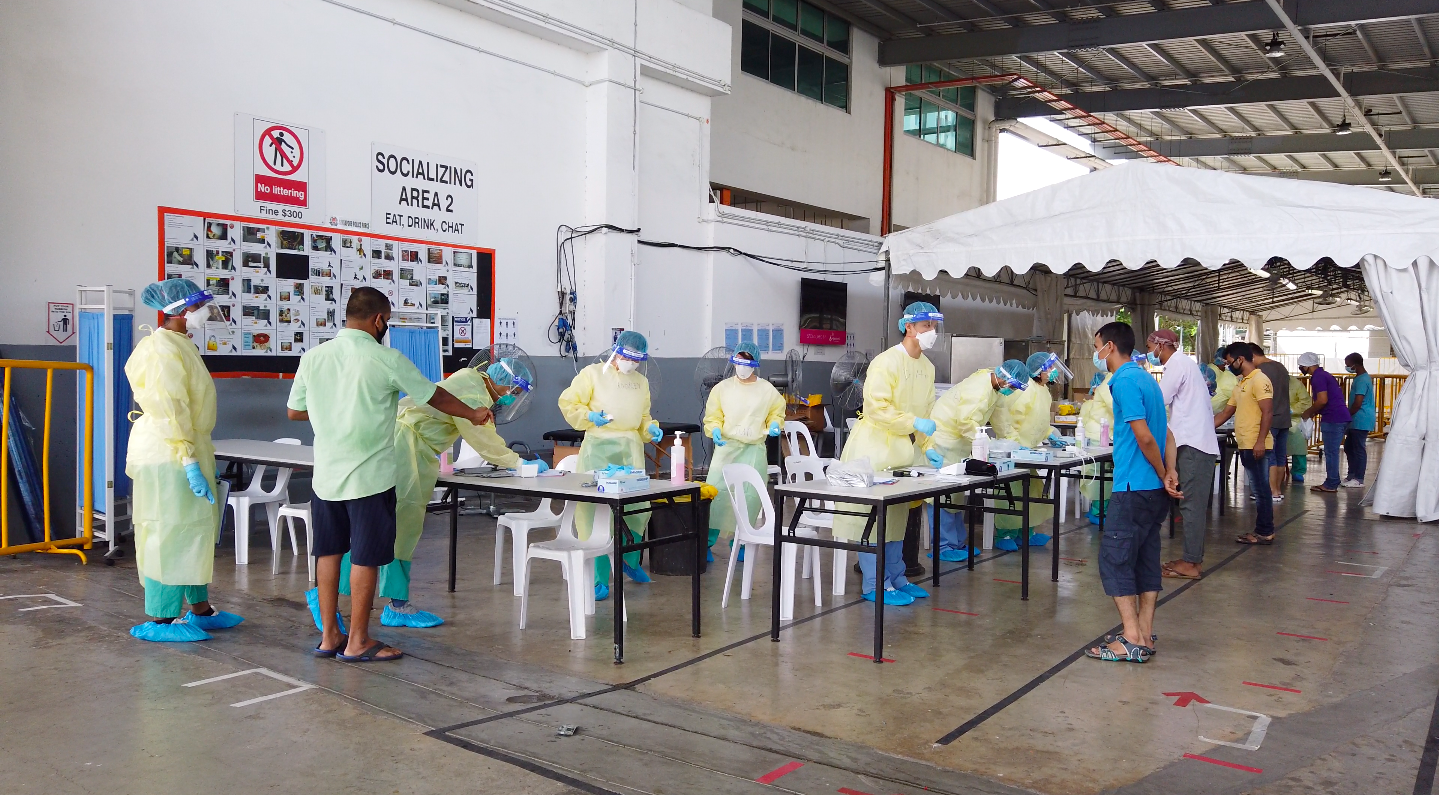 Photo courtesy of National University Health System.
Photo courtesy of National University Health System.
The number of doctors on the team on any given day varies, he says — "some days it might be four; some days we have six."
There are also teams of doctors who do rounds to the sick bays of the dormitories.
At the medical post, Zubair estimates they see around 150 patients each day, which he describes as "very intense".
"The psychological barrier is there, because you are dealing with an enormous number of patients," he tells us.
Each block in the dormitory sends their patients — usually around 30 to 35 per block — down to the medical post at a specific time.
At the medical post, they are triaged and screened, in order to separate those who have acute respiratory illness (meaning they are likely to be a Covid-19 patient) and those who do not have respiratory symptoms but might have other chronic problems.
Zubair says that the vast majority of the patients they see are not very sick. The doctors then give them symptomatic treatment to address the issues at hand, such as giving them Panadol and advising them to stay hydrated and rest.
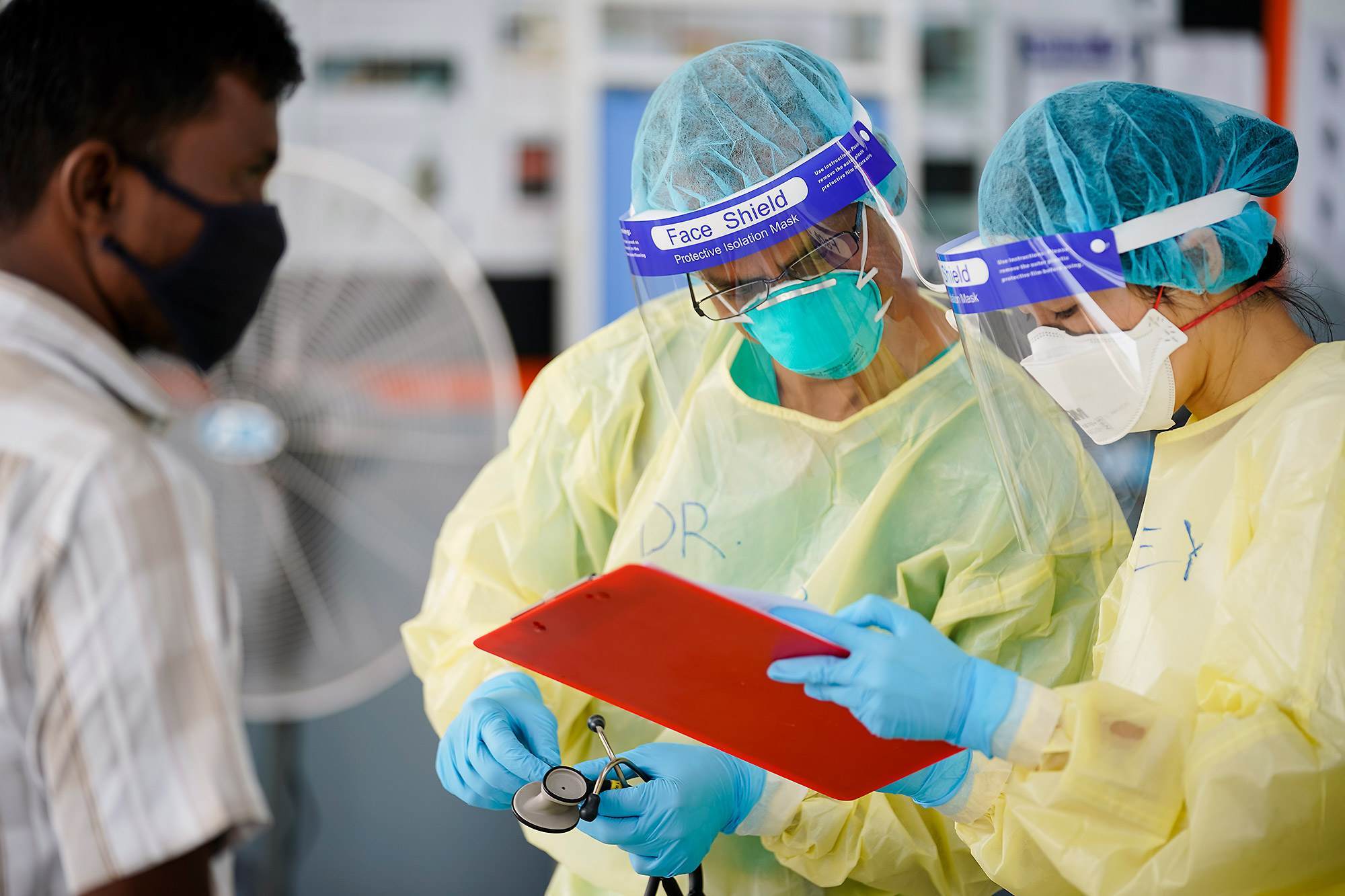 Dr. Zubair (centre) seeing a patient. Photo courtesy of National University Health System.
Dr. Zubair (centre) seeing a patient. Photo courtesy of National University Health System.
They give the patients information about what to look for in case they develop symptoms that require further medical attention.
And their work goes beyond the clinical — the medical staff also encourage the workers to spread the word to their friends and colleagues that help is available.
From air-conditioned hospital wards & clinics to full PPE gear in open-air medical stations
The role that Zubair takes on at the dormitory medical post is very different from his everyday role as a paediatrician and neonatologist, in which he primarily works with small children and premature infants in hospital and clinic settings.
When the call for volunteers to work in the dormitories came, he admits that the vast difference between his day job and that which would be required of him seeing migrant worker patients was what he describes as a "mental inhibition" he needed to overcome.
"The organisation and atmosphere, it's very different than the hospital, of course, because the hospitals here are much more equipped — it’s a tertiary care, our mindset is different.
But over there [in the dormitories], we need to reorient ourself to a different environment, kind of learning and relearning how to go back to our basics and providing care to this very vulnerable group of patients."
On top of the mindset challenge, there is also the physical challenge of working at the non-air conditioned, open-air medical posts in the dormitories.
Being decked in full personal protection equipment (PPE) means that it can get extremely hot and sweaty for them. They are also constantly on their feet, as they go around to different patients to examine and talk to them.
"So it's a very different working environment. But as I said, it's rewarding," he says.
Developing trust between unfamiliar doctors and with patients you see for 5-7 minutes
The set-up of the dormitory medical posts has also presented a unique dynamic for the relationships formed, both between colleagues and between medical staff and patients, says Zubair.
As the team of volunteers changes every day, the people he works with change too.
"We see each other [for] the first time when we are there. And with the N95 and the PPE, you don't actually see the entire face. So you are looking at the person's name on the yellow gown, the protective gown.
But it's so unique that you can build a relationship, trust, within seconds, because you are working for the same purpose."
Similarly, he says the amount of time needed to build trust between patient and doctor is far shorter than what he is used to in hospitals.
"Remember that in tertiary care hospitals — especially the job that I have — it allows me to build up longitudinal relationships with my patients.
So patients that I see, they know me, they trust me, and I know them. I know their personal details, their preferences, and so on."
Meanwhile, at the medical post, those relationships must be formed much more quickly, since they only have time to see each worker for around five to seven minutes.
"Here, you have a very limited time. And, you've [got to] form that doctor-patient relationship within that very, very limited time, build up their trust, assess."
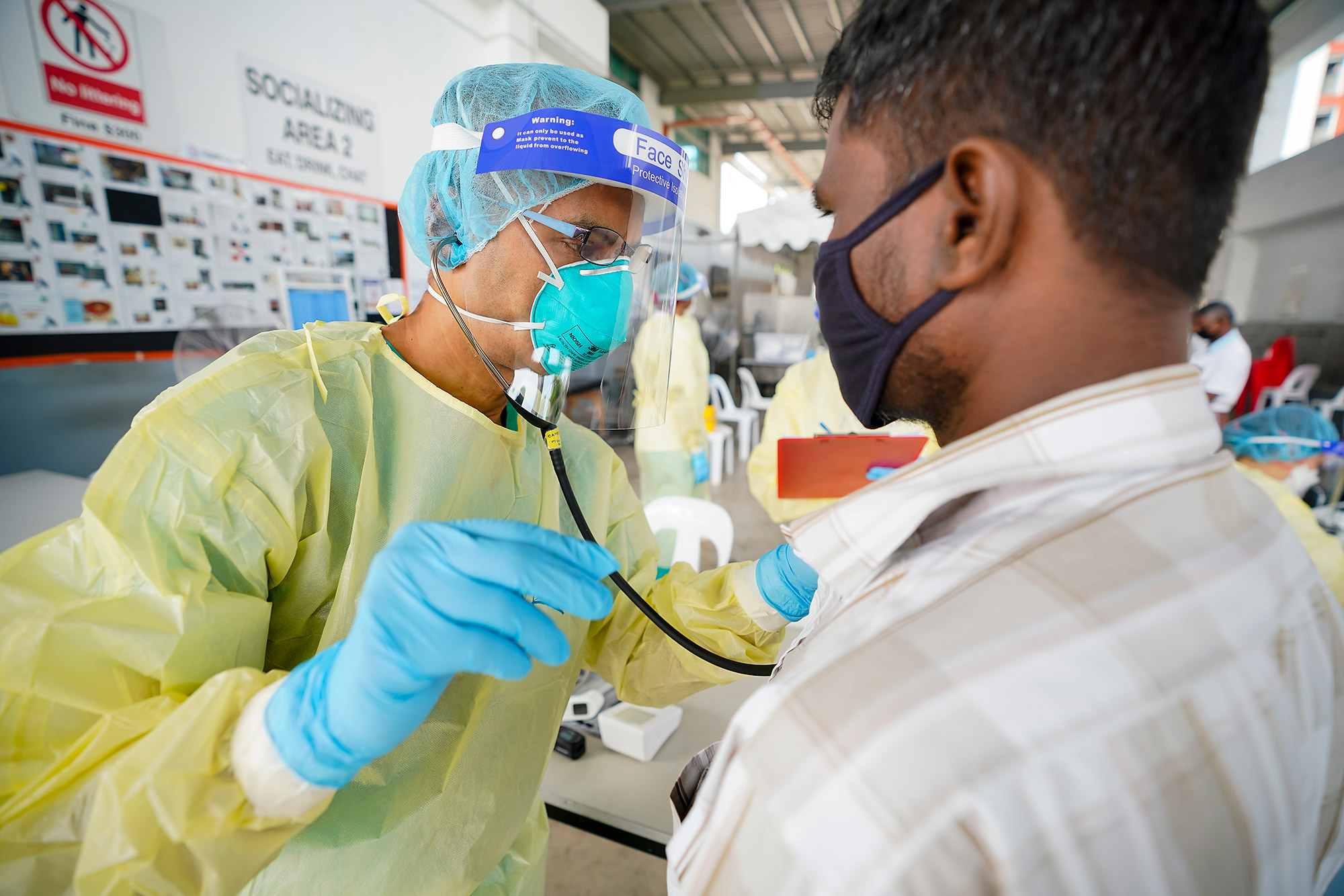 Photo courtesy of National University Health System.
Photo courtesy of National University Health System.
The ability to build trust so quickly between strangers was very striking to Zubair, as was the gratitude that the workers have for the staff volunteering there.
While many workers are fearful of the situation, given the media coverage of the Covid-19 outbreak both in Singapore and in other countries as well as the fact that many have roommates who have tested positive, they are also very grateful, he says.
"Deep inside, they're also very, very grateful that the doctors and the nurses from Singapore’s premier institutes are coming. They feel very comforted that, you know, we are at their doorstep."
The big benefits of speaking and understanding Bengali
One of the interactions that stands out to Zubair is a conversation he had with one worker in Bengali, a language Zubair also happens to speak.
He shares with us how one patient he saw told him: "I feel better already just by talking to you."
"I guess, we often underestimate the power of listening, the power of comfort, when we have a doctor-patient relationship. In these particular situations it's actually more important, more important than anything else, and few words of comfort will do a great job."
"Most of the time, actually, they all need a bit of reassurance, counselling, and hope that this is a disease that, if we work together, we are going to conquer," he explains.
And one way to provide support to the workers, Zubair says, is by ensuring that there are people with the language abilities to connect with the them and provide them culturally-sensitive advice.
Having volunteers who can speak with the workers in their native languages, he notes, is particularly important considering the short amount of time the doctors have with any given patient.
"Remember, that encounter is not like, you know, the 10-minute, 15-minute encounter that we are used to in the hospital setting.
It's actually shorter time, maybe about five minutes, seven minutes.
So it's very important that we quickly understand their problem, and it's much easier if we have a native-speaking doctor or nurse, or even an ops [operations] person there."
Seeing patients and dispensing medicine & medical advice in the Ramadan
One of the ways Zubair, who is Muslim, has been able to support workers is by educating his colleagues and fellow medical volunteers about things to take note of during Ramadan.
In a note shared with his colleagues on Apr. 19, he wrote:
"Next week from 24th onward is the Muslim month of Ramadan or the fasting month. Workers will fast from early dawn (4:45 am) to sunset (7:15 pm).
They won't drink or eat anything including water. They will not even take medicine until it is medically indicated.
We need to remember this special period and prescribe/adjust medicines accordingly.
I'll be very happy to write a brief note for the doctors and nurses on the basic practices during Ramadan."
Zubair says the workers know that they should follow the advice of the doctor, and if they need to stop fasting to take medicine prescribed by a doctor, they will.
However, he points out, it is important for other doctors and nurses to understand that the workers may be going 14 hours without food or water, and adjust if possible.
"It will not affect much, and there are only few medicines that you need to take every eight hours, and [there are] alternative medicines that we can provide that may be given in the morning and then evening."
He has also shared the following points for healthcare professionals caring for migrant workers to note:
- Advise the workers to hydrate themselves well outside of fasting hours.
- Prescribe medicines/injections twice daily instead of thrice/daily if possible.
- Emphasise the importance of observing good personal hygiene, healthy diet and lifestyle.
- Take a break from fasting on medical grounds, when necessary. Remind migrant workers that their health is a priority.
- Capitalise on the ritual ablution or wadu as a way to promote hygiene.
- Empathise with them as they may miss their home and community more dearly.
Ramadan has not affected the dorm operations much, he tells us, as it is "part and parcel" of many of the workers' lives, and those of them who are fasting will just eat their breakfast before the sun rises.
Nor has it affected Zubair's working hours, he says with a laugh:
"No, it's actually made things a bit easier for me, because you don't have to take lunch anymore! Yeah, so it's much more flexible. You hydrate yourself before you come."
That being said, to his Muslim colleagues who are volunteering in various capacities in this period, his message is to just stop working if they feel unwell:
"Just stop, you take break, because that way we can come back the next day and work another four hours, rather than falling sick and taking time off from our work."
Whether or not it's Ramadan, "it's a call of duty"
Despite the difficulty of spending entire weekends working in the heat, layered under PPE, all while fasting, Zubair says whether it happens to be the month of Ramadan or not, it doesn't make a difference to him deciding to volunteer his help:
"Even if it was not the month of Ramadan, I would have been going there and serving equally."
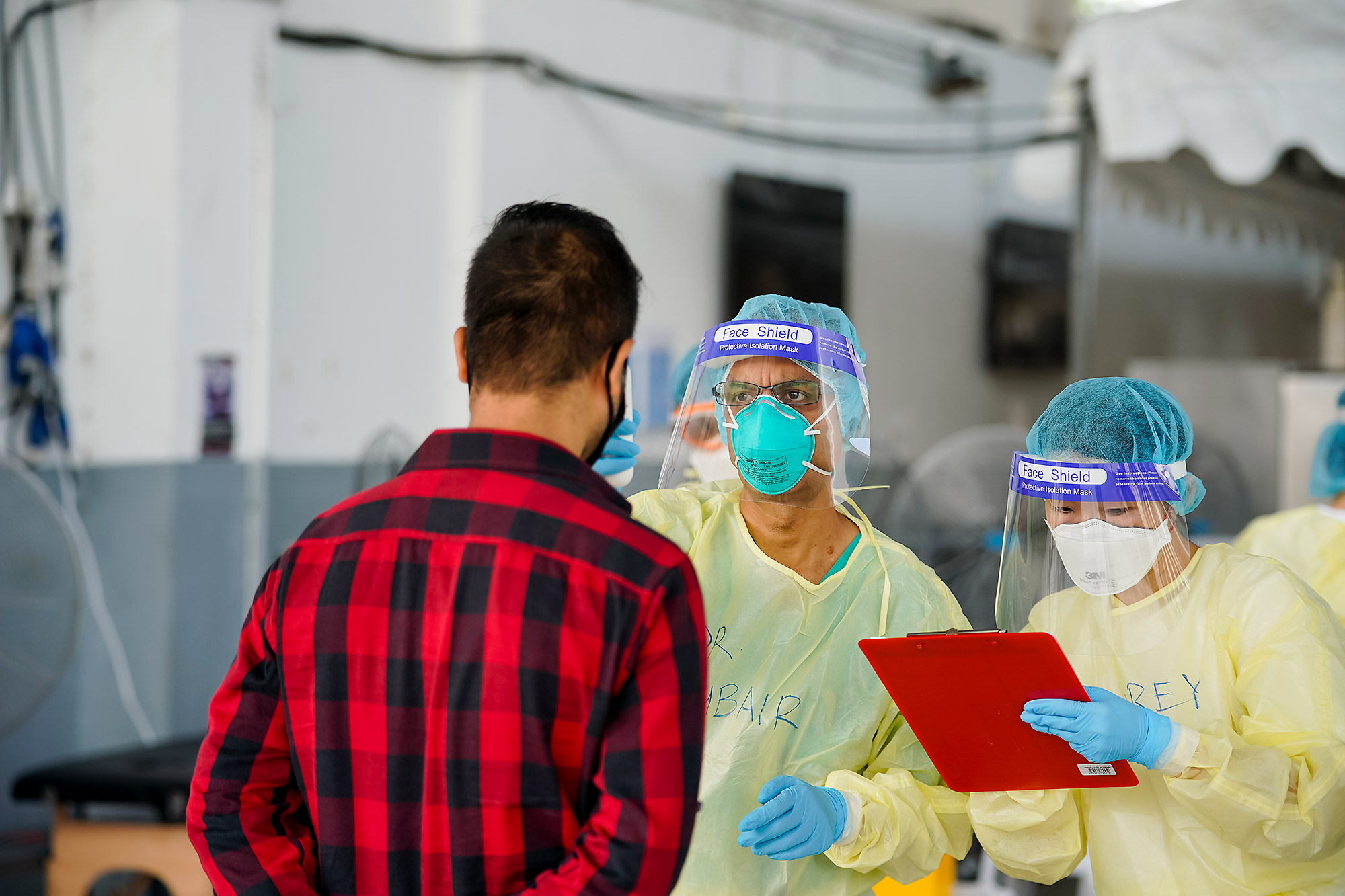 Photo courtesy of National University Health System.
Photo courtesy of National University Health System.
His sense of duty also means that he chooses not to take time off his full-time role to make up for the hours he’s volunteering on the weekends, even though he does have that option.
"I choose not to [take extra time off], because, to me and to many of the doctors and the nurses who are working there, I believe it's a call of duty.
So you feel that, I mean, it should be your own time. It should be your own time, on your own effort."
He does recognise, though, that some of the staff volunteers may need time off, especially those working longer hours, and qualifies that that is perfectly okay.
He also says he has realised that the chance to provide help in the dormitories is a "very, very unique opportunity":
"Not everybody has the right skill, you know, attitude, to go there and try to connect with this group of people.
So I am fortunate in that way. I feel that it is a responsibility that we should take very, very, seriously."
"This is a learning process for all of us... (but) we'll come out stronger"
Despite the still-high numbers of new infections and new dormitory clusters being reported every day, Zubair says he still feels positive about Singapore's ability to overcome the crisis.
"I think I feel optimistic. I think, you know, as I said, that this is a learning process for all of us. I mean, we need to learn, we need to adapt.
And I'm very optimistic that if we work together, if we send the correct message to the dorm residents that we are there to help, do your part and we'll do our part, together we can overcome.
And I'm pretty confident that we'll come out stronger, out of this episode. And we'll learn things that we never thought of learning and that will help us long way."
When we ask him how much longer he plans on volunteering in the dormitories, he of course responds straightaway:
“As long as it's needed. There's no end time. And as long as I can.”
Some quotes have been edited for clarity.
You can check out our interview with Associate Professor Zubair here:
Stories of Us is a series about ordinary people in Singapore and the unique ways they’re living their lives. Be it breaking away from conventions, pursuing an atypical passion, or the struggles they are facing, these stories remind us both of our individual uniqueness and our collective humanity.
Top photos screen captured via video call and courtesy of National University Health System.
If you like what you read, follow us on Facebook, Instagram, Twitter and Telegram to get the latest updates.
